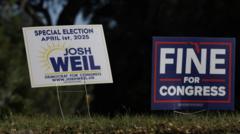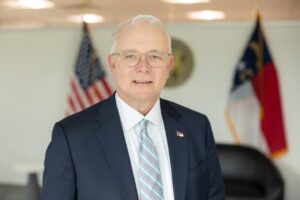The contested race in Florida presents a revealing snapshot of the polarized political landscape as voters prepare for upcoming mid-term elections.
Florida Special Election Tests Political Dynamics Ahead of Mid-Terms

Florida Special Election Tests Political Dynamics Ahead of Mid-Terms
Voter engagement rises as candidates vie for a pivotal congressional seat in Florida's special election.
In a closely watched special election in Florida, Democratic candidate Josh Weil is challenging Republican Randy Fine for a congressional seat in a district long held by the GOP. Speaking to supporters in Ocala, Weil expressed optimism about flipping the seat, which could potentially shift the balance of power in the U.S. House of Representatives. "This is where the 2025 agenda stops," he declared, criticizing Trump's influence over the party.
Randy Fine countered this sentiment during a telephone town hall, warning that "Democrats are mad," indicating a determination among his constituents to preserve conservative values. This contest, which fills the seat left vacant by former Congressman Michael Waltz, has gained national interest, particularly given Weil's surprising fundraising advantage—$10 million to Fine's $1 million—in a district that Trump won by over 30 points last election cycle.
Polling data shows an unexpectedly competitive race, with Weil closely trailing Fine, according an internal poll that even showed him ahead. Republican activists express concern, emphasizing that voter turnout is crucial for maintaining GOP dominance in this traditionally conservative district. "This race should not have any excuses for a Republican loss," remarked Florida-based conservative Randy Ross, acknowledging the necessity for energized Republican voters.
To counteract any potential threats, the GOP has rallied significant support. High-profile figures, including Donald Trump and conservative commentators, have participated in campaign events to encourage turnout for Fine. Conservative financial backing has also flooded in, with Musk's committee contributing over $75,000 to support Fine's campaign.
Meanwhile, the turnout dynamics also favor the Democrats as special elections often reflect higher engagement for the party with more enthusiasm. A Weib win would spell trouble for the Republicans, prompting concerns about their fragile 218-213 majority in Congress.
The stakes for both parties are high as they look to frame the election's outcome. While Republicans downplay the race's national significance, some suggest that Fine's lackluster campaign is to blame for the tight contest. Democrats, on the other hand, frame the results as vital indicators of a shifting political sentiment among voters.
Both parties recognize the potential long-term implications of the election on strategies for the upcoming midterms. Democratic leaders see an opportunity to energize their base and regain ground lost in previous elections, while Republicans aim to bolster their position and dispel fears of a repeating Democratic wave.
As the election results loom, the Florida race becomes a critical bellwether for voters' sentiments ahead of the mid-term elections, reflecting broader national trends and concerns as the political landscape continues to shift.






















